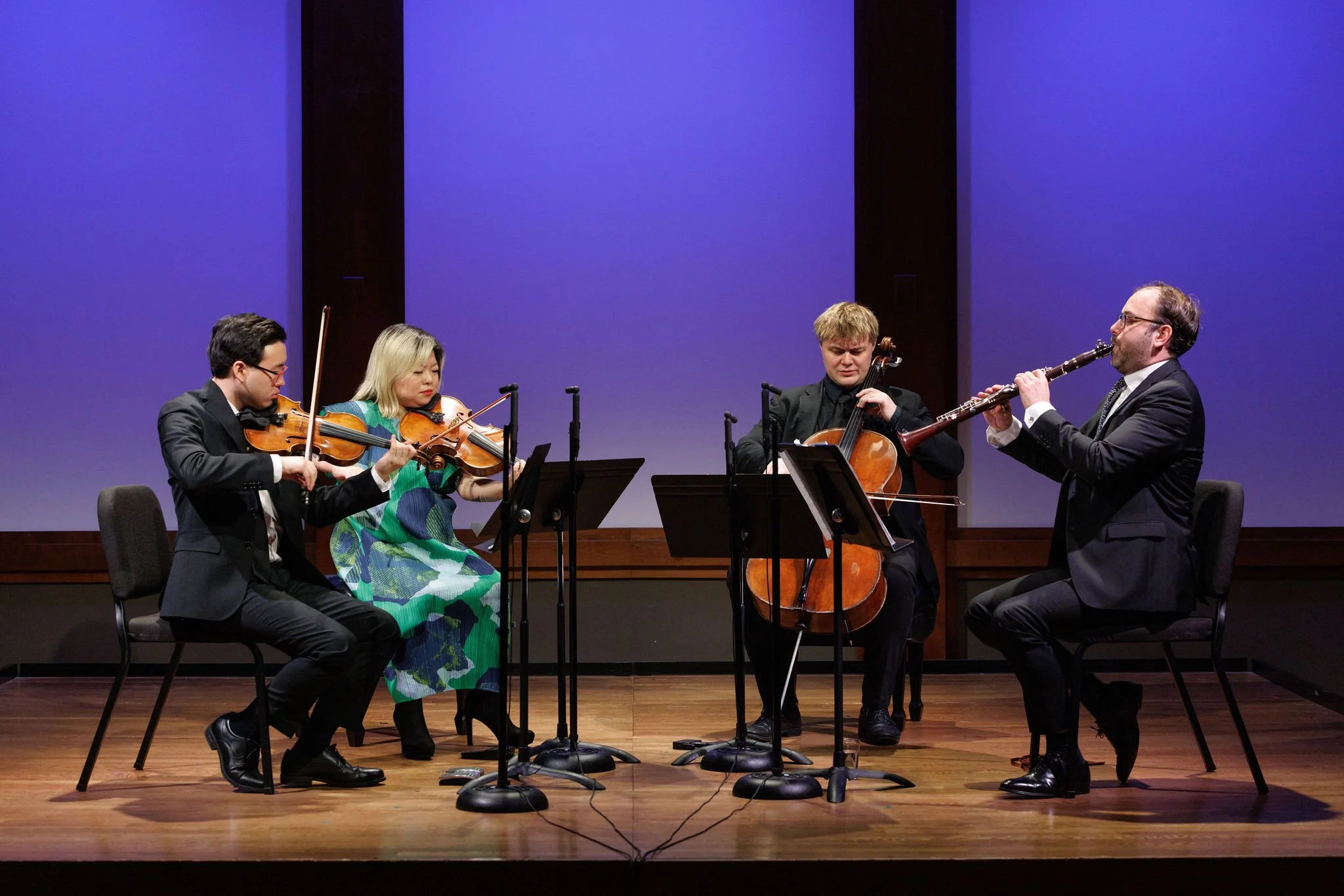REVIEW: Junction Trio’s Impactful Debut at 92NY
Above photo courtesy of 92NY.
November 1, 2024
The Junction Trio is more than a piano trio. The triad of violinist Stefan Jackiw, cellist Jay Campbell, and pianist Conrad Tao is a juggernaut. The threesome made an impactful debut at 92NY on Friday in a daring gambit, deploying two warhorses of the genre alongside a spunky world premiere.
Their first piece, the Piano Trio No. 2 in E Minor, Op. 67, by Dmitri Shostakovich, spoke uncannily to our times, programmed perhaps by premonition. The Russian composer’s response to Soviet totalitarianism dates from 1944, and paints such a vivid portrait of life during World War II that it was banned from performance from 1948 until Stalin’s death in 1953.
Their performance exhibited the battalion of prowesses that Jackiw, Campbell, and Tao bring to this junction, individually and as a unit. Campbell’s solo career is driven by a fierce commitment to new music; Tao is a fiercely talented composer and improviser; Jackiw premiered Tao’s Violin Concerto, and will soon play the Ives’ violin sonatas with pianist Jeremy Denk. Together they are a force in new music, forging probing intelligence with openness and curiosity.
They are awake to the poetic potential of music, assuredly ascending the expanse of the first movement (Andante - Moderato) with patient pacing. It opened with Campbell whispering an eerie lament in stratospheric harmonics, joined by Jackiw in a low, mournful register, and then Tao drew contours in sparse, transparent piano lines. Tension ratcheted intensely in grooving, pulsing eighth-notes, as the mood shifted from bitter defiance to bleak pessimism.
Photo courtesy of 92NY.
The trio was clearly having fun in the sardonic second movement (Allegro con brio) chasing each other in complex maneuvers more thrilling to witness than the Kentucky Derby or the Indy 500. The third movement, a Largo passacaglia, was an exercise in negative space, and exhibited the three musicians’ keen interpretive imaginations. The movement builded to an extended outburst of such soaring passion that Jackiw's violin sprung a string, requiring an unplanned interruption: Jackiw replaced the string and they continued strategically, whereupon his passion was even more fervent, and I worried he would break another.
The indelible tunes in the ironic finale (Allegretto - Adagio) have a strong Jewish spirit — fatalistically evocative of Nazi camps — and are illustrative of Shostakovich’s assertion (in Testamony) that music “…can appear to be happy, while it is tragic. It’s almost always laughter through tears. This quality of Jewish music is close to my ideas of what music should be. There should always be two layers in music.”
This movement, even with the best of intentions, could easily slip into the perilous trap of sounding like Fiddler on the Roof. But, JCT’s meticulous attention to detail and deadpan delivery prevented any such association.
There’s an element of derisive satire in Shostakovich, but John Zorn’s Philosophical Investigations II — a sequel to the avant-garde saxophonist and composer’s previous Philosophical Investigations from 2022 (premiered by the Junction Trio at their Carnegie Hall debut) inspired by Austrian philosopher Ludwig Wittgenstein’s “language games” — was outright absurdism. Quotations of the forthcoming Brahms Trio were interrupted, splattered, and scratched out, like indignant, cartoony pop-art — an extended Ives-ish joke.
Johannes Brahms’s Piano Trio No. 1 in B Major, Op. 8, in the revised version from 1889, demonstrated the searching ambition these intrepid explorers bring to the stage. They clearly approached the oft played work with fresh ears, and infused it with the same commitment to poetry and humor as the Shostakovich.
On occasion, I worried that Jackiw’s heavy-hand with non-vibrato and husky sotto voce colorations veered into commentary or mannerism. However, the second movement, Scherzo: Allegro molto, sparkled and floated, and its Trio section blossomed into a juicy, magisterial song of redemption; the prayerful Adagio stopped time, and the Finale: Allegro was brisk and breezy, with a whiff of bittersweet.
Photo courtesy of 92NY.
***
Junction Trio’s next appearance:







